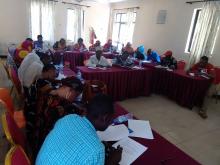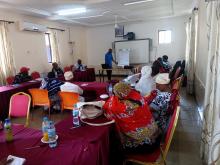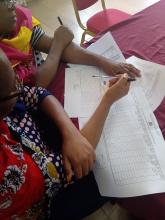Empowering community health providers to tackle lung diseases
22 February 2019, Tanga – The Ministry of Health in Tanzania conducted orientation workshops on integrated screening, referral and follow up for Tuberculosis and other Chronic Lung Diseases to 20 Community Health providers in Tanga region. This initiative is supported by the World Health Organization and aims to embody the leverage of resources in addressing community needs in primary health care delivery. As most of the other Chronic Lung Diseases are not infectious in contrast to Tuberculosis, the implementation of the initiative is done jointly by the National TB and Leprosy Programme and Non-Communicable Diseases department of the Ministry of Health in the country.
Communities often regard cough as a normal condition that naturally subsides without the need for medical investigation or treatment. As a result, substantial cases of chronic lung diseases are diagnosed late and in advance condition. As the global community is geared toward Ending Tuberculosis by 2030, integrated, cost-effective and decentralized general health services for the community's health problems could be vital in attaining in achieving health for all. Moreover, integration facilitates access to diagnostic and treatment services, reduction of stigma and simplified contact tracing.
The two-day workshop training was therefore organized to introduce Community Health Providers on the concepts of tuberculosis and other chronic lung diseases causes; symptoms and care of these patients in the community; approaches for integrating the two conditions in screening, referral, and follow-up. Moreover, participants did practical exercises in filling the integrated registers and report form up tools. By the end of the workshop, participants showed outstanding level of knowledge gain, from 45% average score before training to 72% average score after training. This training workshop preceded regional partners sensitization, and the regional health management team and community partners expressed enthusiasm to see this initiative a success. The initiative will be assessed after six months of implementation to learn a change in case detection for Tuberculosis and other Chronic Lung diseases.






